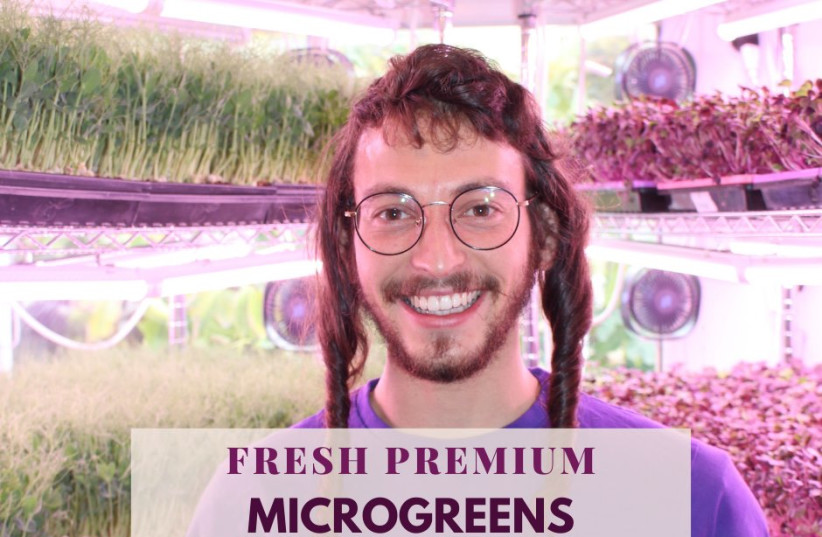Reuven and Orya Marriot live in the town of Otniel and run their farm out of a caravan and are driven by the mission of environmentalism.
By STEVE LINDE JULY 29, 2021

My sister is on a plant-based diet – she calls it a lifestyle – that appears to be both healthy and tasty. She referred me to Reuven and Orya Marriott, a young couple who own, farm and operate “Israel Microgreens.”
“We are passionate about providing a premium, fresh, farm-to-table product packed full of health benefits for you and your family,” they say on their website. Microgreens, Reuven explains, are young vegetables grown for 8-10 days to harvest in their so-called vertical farm, and are considered a “superfood.” The nutrients in microgreens contain higher vitamin, mineral and antioxidant levels than in adult vegetables – “up to 40 times higher,” says Reuven. The Marriotts currently grow broccoli, kale, radish (pink and purple), sunflowers and peas.Reuven grew up in London and Florida and moved to Israel in 2014 when he was 18. He studied at a yeshiva, served in Golani, married Orya – who is from Ma’agalim – and they settled in Otniel, an Orthodox Jewish community in the Judean Mountains.
“The farm, which is now in a caravan in Otniel, is in the process of moving to Bnei Re’em, while the family (they just had their first first child) is moving to Aluma, near Kiryat Gat,” Reuven tells me on the phone.
How did it all begin? “I was very interested in gardening and farming – ‘homesteading’ is the term they use in America for growing your own vegetables,” Reuven says. “When Covid happened, and there were food issues and shortages, I decided I wanted to make a career out of sustainable, local agriculture.” He consulted with Nimrod Walb, who has an ecological farm in Pardes Hanna, purchased material from a friend named Shalom Stark, and launched Israel Microgreens in October 2020. “It’s a great way to grow high-quality vegetables on a small scale with just a room and no land,” he says.
The Marriotts plan to add several varieties including edible flowers, sell to top chefs and extend deliveries from central and southern Israel northwards, including the Tel Aviv area. “Although it’s been popular for some time in the high-class restaurant world, I think the idea of plant-based products is really coming into its own now,” Reuven says. “I don’t think this is some kind of fad or trend. I think it’s here to stay because people are realizing that healthy eating is important. I think Covid did a lot to move this back into the spotlight.”
Asked how it fits their view of Judaism, Reuven says, “From a land-usage perspective, an environmental standpoint and how we view the world in general, it’s important to reduce the consumption of meat and grow plant-based products instead. As Jews, we are here to be guardians of the land, and improve what we’ve got for the next generation. Eating plant-based food is not only healthy for us; it’s healthy for the land and healthy for the planet.”
Reuven says the way they grow vegetables – “quasi-hydroponically on trays filled with coconut fibers” – is permitted during shmita, the sabbatical year under which Jewish law requires the land to lie fallow. “Because we’re not growing the vegetables in the land, shmita doesn’t apply to us,” he says.Their dream? “Most of our clients are private, but we do work with chefs as well, and the idea is to expand to upscale restaurants and hotels,” says Reuven. “Our big dream is to produce field vegetables in a sustainable and regenerative way, allowing us to improve the land that we grow on while providing high-quality produce.”
For more information, go to israelmicrogreens.com, email farm@israelmicrogreens.com, or visit their Facebook or Instagram pages.
